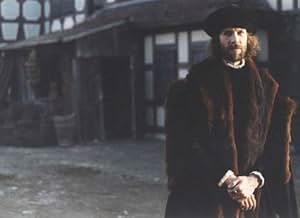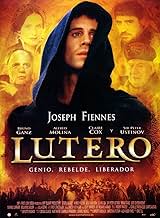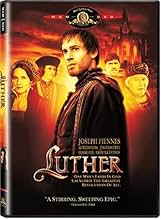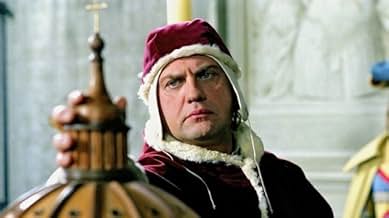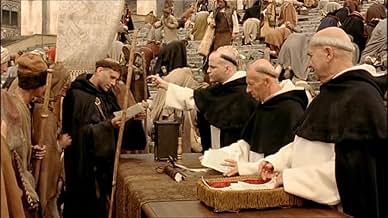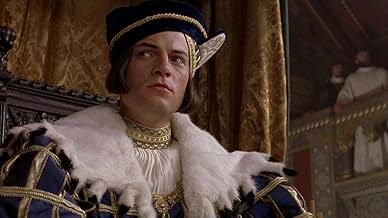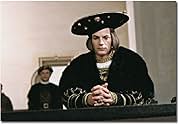VALUTAZIONE IMDb
6,6/10
16.450
LA TUA VALUTAZIONE
All'inizio del XVI secolo, il monaco tedesco idealista Martin Lutero, disgustato dal materialismo nella Chiesa cattolica, inizia il dialogo.All'inizio del XVI secolo, il monaco tedesco idealista Martin Lutero, disgustato dal materialismo nella Chiesa cattolica, inizia il dialogo.All'inizio del XVI secolo, il monaco tedesco idealista Martin Lutero, disgustato dal materialismo nella Chiesa cattolica, inizia il dialogo.
- Premi
- 4 vittorie e 1 candidatura in totale
Peter Ustinov
- Frederick the Wise
- (as Sir Peter Ustinov)
Recensioni in evidenza
I just came from the St. Louis premier (in conjunction with the 14th annual Theological Symposium at Concordia Seminary) and am very impressed with the film. Not only is it entertaining, but it follows the history of Luther's early years of ministry quite faithfully. Sure, some things were fictionalized to get us from one scene to another, but the facts of the reformation movement, and the realities of life in the 16th century are brought to great realism on the screen.
The performances of Fiennes, and Ustinov were particularly strong, but I think viewers will fall in love with Ustinov's portrayal of Prince Friedrich, the Wise. He's like the cuddly grandpa you always wished you had (or maybe you did have) who didn't care what people thought of them, said and did what they pleased, and no one gave them any crap for it. I truly think it is Oscar calibre work. I think you will too.
Firth as Aleandro was convincing as the Roman Bureaucrat determined to get ahead by keeping the peace between Leo and Charles. Ganz plays a great pastor to Luther - throughout his life - one that we should all be so lucky to have looking after our spiritual well being.
Hofschneider, as the eager to learn and willing to "suffer all for the Gospel" assistant (Ulrick) to Luther made it very easy for the viewer to feel a connection to him. His loyalty was genuine, and not self serving. A true man of the cloth.
Although not on screen long, Clair Cox does a nice job showing just how strong a woman Katie was. Is it any wonder that she went on to run a rather successful business apart from Martin's influence?
For sure this is a courageous movie about a stalwart leader of Church, state, and society to whom western civilization owes a great debt. While the 1950's version of Luther may be more complete in some respects, it is not nearly as accesable to today's viewers who are used to big budget, visually stimulating, and fast paced movies
The performances of Fiennes, and Ustinov were particularly strong, but I think viewers will fall in love with Ustinov's portrayal of Prince Friedrich, the Wise. He's like the cuddly grandpa you always wished you had (or maybe you did have) who didn't care what people thought of them, said and did what they pleased, and no one gave them any crap for it. I truly think it is Oscar calibre work. I think you will too.
Firth as Aleandro was convincing as the Roman Bureaucrat determined to get ahead by keeping the peace between Leo and Charles. Ganz plays a great pastor to Luther - throughout his life - one that we should all be so lucky to have looking after our spiritual well being.
Hofschneider, as the eager to learn and willing to "suffer all for the Gospel" assistant (Ulrick) to Luther made it very easy for the viewer to feel a connection to him. His loyalty was genuine, and not self serving. A true man of the cloth.
Although not on screen long, Clair Cox does a nice job showing just how strong a woman Katie was. Is it any wonder that she went on to run a rather successful business apart from Martin's influence?
For sure this is a courageous movie about a stalwart leader of Church, state, and society to whom western civilization owes a great debt. While the 1950's version of Luther may be more complete in some respects, it is not nearly as accesable to today's viewers who are used to big budget, visually stimulating, and fast paced movies
Wow, here's an oddity: a modern-day film faithful to theological history, an uncompromising biography of Martin Luther.
Knowing the film world, I doubt this film was made to glorify God. It probably was made more to make the Roman Catholic church look bad, or to glorify a rebel and a man of the people: "the peoples' liberation" as the back cover of the DVD states.
Whatever the motive, it stays true to history and it's nice to see that for a change. To those unfamiliar with Luther, he was the founder of the Protestant denomination. Luther was monk who saw and heard things he thought were unscriptural and broke off from the Catholic Church in "protest." Hence, the "Protestant" church was formed.
Anyway, not only was the story done well, so was the cinematography. This is one gorgeous movie to ogle, well-filmed with high production values. The scenery, sets and costumes are all first-rate.
Joseph Fiennes (Luther) is a bit wimpy-looking but his character certainly isn't. As the subject of indulgences and other practices begin to transform Luther's ideas of what Jesus' church should be, the story grows in intensity as Luther gets pressured by the Catholic hierarchy as his protest issues become public.
What happens to him and to the masses because of his actions are revealed in pretty dramatic form. Obviously the story is far more complex than two hours can give it but the filmmakers did a pretty good job condensing it to make the time constriction.
Notes: This was Peter Ustinov's last movie. On the DVD, being that is was a fairly expensive one, I am surprised there were no "extras." In all, however, a solid film but it will definitely offend Roman Catholics.
Knowing the film world, I doubt this film was made to glorify God. It probably was made more to make the Roman Catholic church look bad, or to glorify a rebel and a man of the people: "the peoples' liberation" as the back cover of the DVD states.
Whatever the motive, it stays true to history and it's nice to see that for a change. To those unfamiliar with Luther, he was the founder of the Protestant denomination. Luther was monk who saw and heard things he thought were unscriptural and broke off from the Catholic Church in "protest." Hence, the "Protestant" church was formed.
Anyway, not only was the story done well, so was the cinematography. This is one gorgeous movie to ogle, well-filmed with high production values. The scenery, sets and costumes are all first-rate.
Joseph Fiennes (Luther) is a bit wimpy-looking but his character certainly isn't. As the subject of indulgences and other practices begin to transform Luther's ideas of what Jesus' church should be, the story grows in intensity as Luther gets pressured by the Catholic hierarchy as his protest issues become public.
What happens to him and to the masses because of his actions are revealed in pretty dramatic form. Obviously the story is far more complex than two hours can give it but the filmmakers did a pretty good job condensing it to make the time constriction.
Notes: This was Peter Ustinov's last movie. On the DVD, being that is was a fairly expensive one, I am surprised there were no "extras." In all, however, a solid film but it will definitely offend Roman Catholics.
The life of the 16th-century German monk Martin Luther (1483-1546) was filled with inner compulsions, focusing on his crucial years of his crusade against the Catholic Church, leading to his break with the Roman Catholic Church
Director Eric Till presents Rome as a shattered city where depravity was everywhere This infuriated Luther who could not believe that Rome is a circus describing it as 'a running sewer, where you can bye anything, sex, and salvation, and where they also have brothels for clerics.'
He also witnesses the church collecting coins from the people supposedly to free their sins to build Saint Peter's Church and would be therefore released from Purgatory and enter the Heaven
Luther was eventually branded a heretic, his books examined and burned, and anyone who presumes to infringe Pope Leo's excommunication will stand under the wrath of Almighty God and the Apostles Peter and Paul
The reaction of the peasants in Germany was against the reaction of the Inquisition who was burning his writings For the German people "you can't burn his ideas." For the Church, his works shall be erased from the memory of man!
Luther's criticism was not against his Holiness, Pope Leo X, but of those rogues who claim to represent him His goal was not to quarrel with the Pope or the Church but to defend them than mere opinion! The Gospel, as he affirmed, cannot be denied for the word of man!
As a loyal son of the Church, Luther finds sanctuary with Prince Frederick, who finds him too daring for him but decides not to surrender him to Rome Luther goes on to produce his first translation of the New Testament Bible into German language He marries the ex-nun, Katerina Von Borg, becomes a hero to the people and in spite of his outlaw status with the Church authorities, his followers ultimately break with Rome
Joseph Fiennes played intensely the intriguing story of a brilliant Augustinian monk with an independent mind who is not interested in comfort but in the truth!
Sir Peter Ustinovin his final rolerealizes the danger Luther poses to the Catholic Church
Alfred Molina as Brother John Tetzel, is the showman terrorizing the good people of Jüterbog into purchasing special indulgences letting everyone know the fires of hell awaiting those who did not contribute
Johann Von Staupitz is the spiritual counselor who knows that Martin has aptitude for law, and could be send to Rome for a legal brief
Claire Cox is Luther's beautiful wife who stood behind her young 16th century monk driven by courage and outrage against a powerful Medieval Church
Director Eric Till presents Rome as a shattered city where depravity was everywhere This infuriated Luther who could not believe that Rome is a circus describing it as 'a running sewer, where you can bye anything, sex, and salvation, and where they also have brothels for clerics.'
He also witnesses the church collecting coins from the people supposedly to free their sins to build Saint Peter's Church and would be therefore released from Purgatory and enter the Heaven
Luther was eventually branded a heretic, his books examined and burned, and anyone who presumes to infringe Pope Leo's excommunication will stand under the wrath of Almighty God and the Apostles Peter and Paul
The reaction of the peasants in Germany was against the reaction of the Inquisition who was burning his writings For the German people "you can't burn his ideas." For the Church, his works shall be erased from the memory of man!
Luther's criticism was not against his Holiness, Pope Leo X, but of those rogues who claim to represent him His goal was not to quarrel with the Pope or the Church but to defend them than mere opinion! The Gospel, as he affirmed, cannot be denied for the word of man!
As a loyal son of the Church, Luther finds sanctuary with Prince Frederick, who finds him too daring for him but decides not to surrender him to Rome Luther goes on to produce his first translation of the New Testament Bible into German language He marries the ex-nun, Katerina Von Borg, becomes a hero to the people and in spite of his outlaw status with the Church authorities, his followers ultimately break with Rome
Joseph Fiennes played intensely the intriguing story of a brilliant Augustinian monk with an independent mind who is not interested in comfort but in the truth!
Sir Peter Ustinovin his final rolerealizes the danger Luther poses to the Catholic Church
Alfred Molina as Brother John Tetzel, is the showman terrorizing the good people of Jüterbog into purchasing special indulgences letting everyone know the fires of hell awaiting those who did not contribute
Johann Von Staupitz is the spiritual counselor who knows that Martin has aptitude for law, and could be send to Rome for a legal brief
Claire Cox is Luther's beautiful wife who stood behind her young 16th century monk driven by courage and outrage against a powerful Medieval Church
The title of Bryan Adams' song "Can't Stop This Thing We Started" aptly describes this 2003 retelling of the story of Martin Luther. The film basically depicts Luther as a good Catholic, loyal to the Pope but horrified by the scandals and corruption that plagued the 16th century Church. He is even more horrified when his effort to reform the Church gets out of control, is co-opted for political purposes, and becomes a popular revolution with the attendant carnage and bloodshed. I suspect Luther has been highly romanticized here. For one thing, the film follows him from age 34 to 50, yet (as embodied by the angelically handsome Joseph Fiennes) he never ages a day. His relationship with Katharina von Bora seems astonishingly chaste -- no struggle with the lusts of the flesh for this pious monk! His demons are of a different kind. We see scenes where Luther seems plagued by demons, thrashing about in his cell, hearing unseen voices. (I know Luther was manic-depressive, but I hardly think he was a madman.) The film provides a good summary or outline of the major events of Luther's life and times: the selling of indulgences, the Ninety-Five Theses nailed to the door of Wittenberg Church, the Diet of Worms (a council presided over by Emperor Charles V), the Confession of Augsburg. The costumes accurately reflect historical reality. If I have any quarrel with the film in this regard, it is that it does not adequately mirror a key factor in the struggle between Germany and Rome: the principle of "cuius regio, eius religio". In other words, local princes and kings imposed their own religious beliefs on the peoples they governed. The cast is a constellation of stars, veritable luminaries, including Sir Peter Ustinov in one of his last roles as Frederick of Saxony. The actors are uniformly excellent in their roles, and the dialogue is well written. The photography is somewhat static, leading me to believe this film was made with television in mind -- albeit of the highbrow kind, in the Masterpiece Theatre tradition. Still, if anyone asked me if I recommended "Luther", I would reply as he did at the Diet of Worms: "Here I stand. I can do no other. God help me."
Possibly one of the most insightful, fascinating, and profound movies to come out in twenty years, "Luther" follows the turbulent struggle between the Catholic church and the country of Germany in the 1500's, revolving around the greatest religious liberator of the middle ages, Martin Luther. Both historically correct in many respects, as well as a fantastically well-written epic with an excessively well-rounded cast (all of which deserve Oscar nominations), the film has many insightful glimpses into one man's journey toward his greatest triumph... the translation of the scriptures into "common" German. If you have any opportunity to view this big-budget Independent film, take it.
From a purely historical standpoint, the film offers a shocking glimpse into power and politics, as Cardinals attempt to bend and wrestle princes and monarchs to their side. It's a shame, but this film will probably not be recognized at the Oscars due to its strong religious tone. Therefore allow it to be said that the center core of actors all deserve Oscars for their performances, particularly Fiennes, Firth, and Ustinov. It was a pleasure to see Fiennes conform to an astonishingly strong, charismatic man who is not faultless, but instead human. The costuming, visual effects, and writing are all fantastic. The dialogue is unusually rich, spattered with direct quotes from Luther's literary works.
The best thing about "Luther" is the quality of the filmmaking. A lot of money was poured into this production, leaving Christian films like Megiddo and Left Behind in the dust. Not only will this receive greater recognition as a "serious" movie, it will also attract larger audiences due to the quality, budget, massive locations, and cast list. Secular audiences will get an open story of salvation. Christian audiences will have the pleasure of finally having a hero to root for in the cinema, a man who stands up for his faith against all odds.
From a purely historical standpoint, the film offers a shocking glimpse into power and politics, as Cardinals attempt to bend and wrestle princes and monarchs to their side. It's a shame, but this film will probably not be recognized at the Oscars due to its strong religious tone. Therefore allow it to be said that the center core of actors all deserve Oscars for their performances, particularly Fiennes, Firth, and Ustinov. It was a pleasure to see Fiennes conform to an astonishingly strong, charismatic man who is not faultless, but instead human. The costuming, visual effects, and writing are all fantastic. The dialogue is unusually rich, spattered with direct quotes from Luther's literary works.
The best thing about "Luther" is the quality of the filmmaking. A lot of money was poured into this production, leaving Christian films like Megiddo and Left Behind in the dust. Not only will this receive greater recognition as a "serious" movie, it will also attract larger audiences due to the quality, budget, massive locations, and cast list. Secular audiences will get an open story of salvation. Christian audiences will have the pleasure of finally having a hero to root for in the cinema, a man who stands up for his faith against all odds.
Lo sapevi?
- QuizThis was Peter Ustinov's final theatrical film before his death on March 28, 2004 at the age of 82.
- BlooperIn the movie Luther quotes the Bible by chapter, and verse. Versification of the Scriptures was not added until five years after Luther's death in 1546. The French scholar-printer Estienne introduced verse numbering and divisions in his Greek-Latin New Testament in 1551. In 1552 he printed a French-Latin New Testament, also with the verse divisions. And in 1553 he printed a French translation of the Bible with verse divisions throughout. Within the same decade the system of verse divisions spread widely, influenced by the adoption of this system in the Geneva Bibles.
- Citazioni
Martin Luther: Unless I am convinced by Scripture and by plain reason and not by Popes and councils who have so often contradicted themselves, my conscience is captive to the word of God. To go against conscience is neither right nor safe. I cannot and I will not recant. Here I stand. I can do no other. God help me.
- ConnessioniVersion of Martin Lutero (1953)
I più visti
Accedi per valutare e creare un elenco di titoli salvati per ottenere consigli personalizzati
- How long is Luther?Powered by Alexa
Dettagli
- Data di uscita
- Paesi di origine
- Lingue
- Celebre anche come
- Lutero
- Luoghi delle riprese
- Coburg, Bavaria, Germania(Veste Coburg, castle)
- Aziende produttrici
- Vedi altri crediti dell’azienda su IMDbPro
Botteghino
- Budget
- 30.000.000 USD (previsto)
- Lordo Stati Uniti e Canada
- 5.791.328 USD
- Fine settimana di apertura Stati Uniti e Canada
- 908.446 USD
- 28 set 2003
- Lordo in tutto il mondo
- 29.632.684 USD
- Tempo di esecuzione
- 2h 3min(123 min)
- Colore
- Mix di suoni
- Proporzioni
- 1.85 : 1
Contribuisci a questa pagina
Suggerisci una modifica o aggiungi i contenuti mancanti


